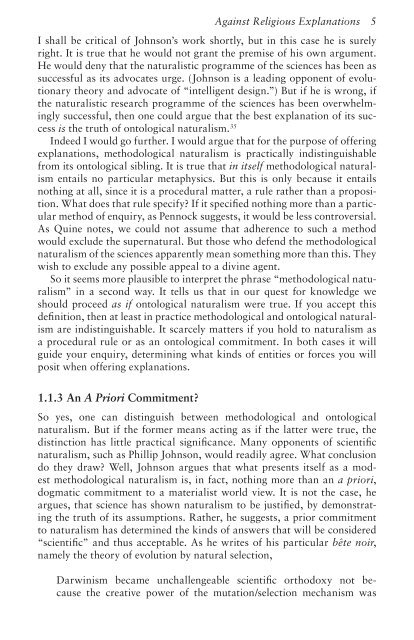Theism and Explanation - Appeared-to-Blogly
Theism and Explanation - Appeared-to-Blogly
Theism and Explanation - Appeared-to-Blogly
You also want an ePaper? Increase the reach of your titles
YUMPU automatically turns print PDFs into web optimized ePapers that Google loves.
Against Religious <strong>Explanation</strong>s 5<br />
I shall be critical of Johnson’s work shortly, but in this case he is surely<br />
right. It is true that he would not grant the premise of his own argument.<br />
He would deny that the naturalistic programme of the sciences has been as<br />
successful as its advocates urge. (Johnson is a leading opponent of evolutionary<br />
theory <strong>and</strong> advocate of “intelligent design.”) But if he is wrong, if<br />
the naturalistic research programme of the sciences has been overwhelmingly<br />
successful, then one could argue that the best explanation of its success<br />
is the truth of on<strong>to</strong>logical naturalism. 35<br />
Indeed I would go further. I would argue that for the purpose of offering<br />
explanations, methodological naturalism is practically indistinguishable<br />
from its on<strong>to</strong>logical sibling. It is true that in itself methodological naturalism<br />
entails no particular metaphysics. But this is only because it entails<br />
nothing at all, since it is a procedural matter, a rule rather than a proposition.<br />
What does that rule specify? If it specifi ed nothing more than a particular<br />
method of enquiry, as Pennock suggests, it would be less controversial.<br />
As Quine notes, we could not assume that adherence <strong>to</strong> such a method<br />
would exclude the supernatural. But those who defend the methodological<br />
naturalism of the sciences apparently mean something more than this. They<br />
wish <strong>to</strong> exclude any possible appeal <strong>to</strong> a divine agent.<br />
So it seems more plausible <strong>to</strong> interpret the phrase “methodological naturalism”<br />
in a second way. It tells us that in our quest for knowledge we<br />
should proceed as if on<strong>to</strong>logical naturalism were true. If you accept this<br />
defi nition, then at least in practice methodological <strong>and</strong> on<strong>to</strong>logical naturalism<br />
are indistinguishable. It scarcely matters if you hold <strong>to</strong> naturalism as<br />
a procedural rule or as an on<strong>to</strong>logical commitment. In both cases it will<br />
guide your enquiry, determining what kinds of entities or forces you will<br />
posit when offering explanations.<br />
1.1.3 An A Priori Commitment?<br />
So yes, one can distinguish between methodological <strong>and</strong> on<strong>to</strong>logical<br />
naturalism. But if the former means acting as if the latter were true, the<br />
distinction has little practical signifi cance. Many opponents of scientifi c<br />
naturalism, such as Phillip Johnson, would readily agree. What conclusion<br />
do they draw? Well, Johnson argues that what presents itself as a modest<br />
methodological naturalism is, in fact, nothing more than an a priori,<br />
dogmatic commitment <strong>to</strong> a materialist world view. It is not the case, he<br />
argues, that science has shown naturalism <strong>to</strong> be justifi ed, by demonstrating<br />
the truth of its assumptions. Rather, he suggests, a prior commitment<br />
<strong>to</strong> naturalism has determined the kinds of answers that will be considered<br />
“scientifi c” <strong>and</strong> thus acceptable. As he writes of his particular bête noir,<br />
namely the theory of evolution by natural selection,<br />
Darwinism became unchallengeable scientifi c orthodoxy not because<br />
the creative power of the mutation/selection mechanism was



